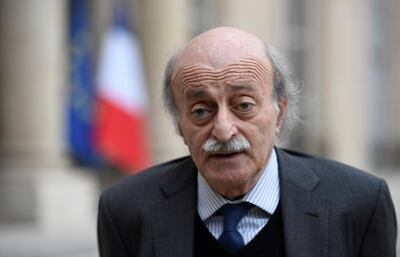Lebanon's veteran Druze leader Walid Jumblatt believes the two ministers representing his party in government should not follow others and resign, he told The National on Tuesday.
Anti-government protests have entered their sixth day, keeping up the pressure on the country's political elite amid calls for new leadership.
In a bid to appease the unrest, the Lebanese Cabinet was spurred into passing an emergency economic reform package on Monday.
The leader of the Christian Lebanese Forces party, Samir Geagea, announced the resignation of his ministers a day earlier, saying those from Mr Jumblatt’s Progressive Socialist Party would follow.
But Mr Jumblatt, Lebanon’s most prominent political survivor, said that would not happen.
"I presented my objections," he said. "I know there is dissatisfaction among my party and I will wait for the moment to resign, but I am not sure it is worth it.
"I will suggest a Cabinet shuffle and we will see."
Mr Jumblatt said the demonstrations were more significant than in 2005, when weeks-long protests pushed Syrian troops out of Lebanon after 29 years of occupation.
This was because they spontaneously spread all over the country instead of remaining limited to Beirut, he said.

“The Lebanese people have proved once again that they truly want change,” Mr Jumblatt said.
“This is a spontaneous revolt that has exceeded confessional and party divisions because leaders have failed to respond to the people’s demands. I do not think it will calm down soon."
Progressive Socialist minister Wael Abou Faour on Monday evening explained why he left the Cabinet meeting that morning along with his party colleague, Akram Chehayeb.
“We left the meeting because some still live in pre-demonstration times," Mr Abou Faour said.
"We left the Cabinet session and not the government because we still believe that change from within can impact demonstrations in the street.”
He said that his party “shared the demonstrators’ mistrust” of the government.
The PSP has been vocal in the past about its disagreements with the Free Patriotic Movement, founded by President Michel Aoun but now run by his influential son-in-law and Foreign Minister, Gebran Bassil.
One solution to appease protesters would be to pass a new, non-sectarian electoral law, Mr Jumblatt said.
“The current representatives of the people were elected through a confessional law that does not really represent popular demands,” he said.
In Lebanon, power is shared between the country’s 18 sects.
High-profile administrative positions, such as leadership of the army or security services, are also divided between sects.
Voting in a new electoral law would be a “fundamental challenge” for the government, Mr Jumblatt said.
“All people must be represented to be able to change the ruling class,” he said.
After years of wrangling, Lebanese politicians passed a new electoral law in June 2017 that for the first time included elements of proportional representation.
But the complex law that includes votes for lists and preferential candidates was criticised by politicians and activists as being tailored to the interests of main parties.
In last year’s election, the first in nine years, the Lebanese people overwhelmingly re-elected the same parties and leaders who have led the country since the end of the civil war in 1990.










